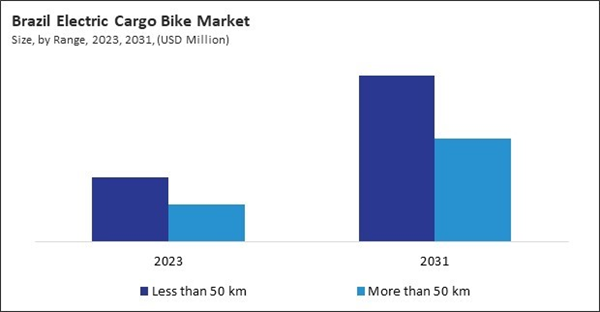The Brazil market dominated the LAMEA Electric Cargo Bike Market by Country in 2023, and would continue to be a dominant market till 2031; thereby, achieving a market value of $116 million by 2031. The Argentina market is registering a CAGR of 15.3% during (2024 - 2031). Additionally, The UAE market would capture a CAGR of 13.5% during (2024 - 2031).
Electric cargo bikes are increasingly recognized for their cost-effectiveness compared to traditional delivery vehicles. One key factor contributing to their lower overall costs is their reduced maintenance requirements. Unlike traditional vehicles that rely on complex internal combustion engines, electric cargo bikes have fewer moving parts and simpler mechanical systems, resulting in lower maintenance costs over their lifespan. This makes them an attractive option for businesses looking to minimize operating expenses.
Another significant cost-saving aspect of electric cargo bikes is their lack of fuel expenses. In regions with high fuel prices, the frequent refuelling requirements of conventional delivery vehicles (e.g., vans and trucks) can be a significant operational expense. As an alternative, electric cargo bikes are propelled by rechargeable batteries that are electrically charged; this makes them a significantly more economical and reliable fuel source. This makes electric cargo bikes a cost-effective alternative for businesses seeking to reduce fuel expenses and overall operating costs.
Due to sustainability initiatives, urban congestion, and the expansion of e-commerce, countries such as the United Arab Emirates (UAE) are observing the electric cargo bike market expand in the Middle East. The e-commerce sector in the United Arab Emirates (UAE), which comprises 10% of total retail sales and increased by 53% in 2020 to a record $3.9 billion, is the largest in the Gulf Cooperation Council (GCC), according to the International Trade Administration.
In the first quarter of 2023, the e-commerce sector in the Kingdom of Saudi Arabia experienced an unprecedented annual growth rate of more than 32 percent. Furthermore, the expansion of the Middle Eastern market is being bolstered by governmental endeavours aimed at promoting sustainable transportation and electric vehicles. Therefore, owing to all the aforementioned factors, the demand for electric cargo bikes is expected to increase in the LAMEA region, providing an opportunity for further market development.
Based on Range, the market is segmented into Less than 50 km and More than 50 km. Based on Application, the market is segmented into Personal Use, Delivery & Courier, Waste & Municipal Services, and Others. Based on Type, the market is segmented into Front Loader and Longtail. Based on countries, the market is segmented into Brazil, Argentina, UAE, Saudi Arabia, South Africa, Nigeria, and Rest of LAMEA.
List of Key Companies Profiled
- Yuba Bikes
- Mobility Holdings, Limited (Tern)
- Amsterdam Bicycle Company BV
- Avant Enterprises, Inc. (Aventon)
- Priority Outdoor Products, LLC
- Riese & Müller GmbH
- Bunch Bikes, Inc.
- Pon Holdings B.V. (Houdstermaatschappij Wilg B.V.)
- Rad Power Bikes Inc.
- RYTLE Mobility GmbH
Market Report Segmentation
By Range
- Less than 50 km
- More than 50 km
By Application
- Personal Use
- Delivery & Courier
- Waste & Municipal Services
- Others
By Type
- Front Loader
- Longtail
By Country
- Brazil
- Argentina
- UAE
- Saudi Arabia
- South Africa
- Nigeria
- Rest of LAMEA
Table of Contents
Companies Mentioned
- Yuba Bikes
- Mobility Holdings, Limited (Tern)
- Amsterdam Bicycle Company BV
- Avant Enterprises, Inc. (Aventon)
- Priority Outdoor Products, LLC
- Riese & Müller GmbH
- Bunch Bikes, Inc.
- Pon Holdings B.V. (Houdstermaatschappij Wilg B.V.)
- Rad Power Bikes Inc.
- RYTLE Mobility GmbH









